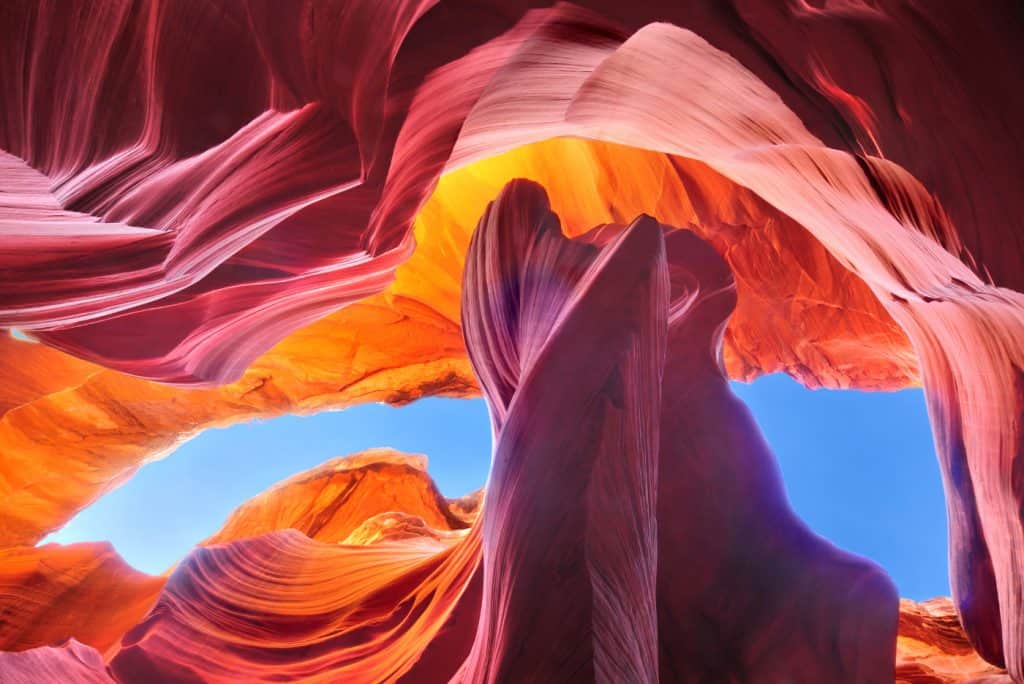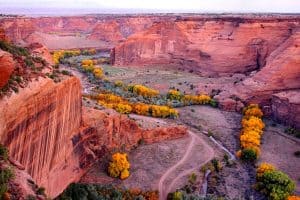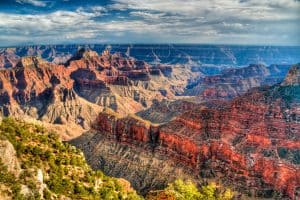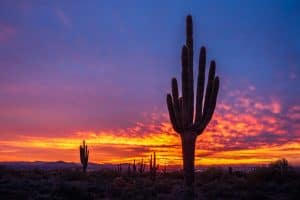- TRAVEL GUIDES
arrow_drop_down
- Canada
- United States
- Sunny Destinations
arrow_drop_down
- VIEW ALL
- BUCKET LIST
- ABOUT
- CONTACT
Guide to Visiting Antelope Canyon: Top Insider Tips
- Arizona
- USA
-
Apr 16
- Share post

Table of Contents
About Antelope Canyon
Antelope Canyon, once hidden in the shadow of the Grand Canyon, now shines as a favorite spot for travelers from all around.
Located in the Navajo Indian Reservation near Page, Arizona, this natural wonder is one of the most photogenic sites on the globe.
The canyon was formed as a result of sandstone erosion from flash floods weaving through the rocks over thousands of years. The walls are spectacularly smooth with swirling formations, measuring approximately 120 feet between the stream bed and the rim of the gorges.
Large number of antelopes used to graze and wander around the area and to no one’s surprise, the site was named “Antelope Canyon” after this fact.
The site is rich in history and boasts a fascinating cultural story – the Navajo tribe believed the site was spiritual and sacred.
Due to the site’s significance in heritage, the Navajo tribe converted Antelope Canyon into a Navajo Tribal Park in 1997, and since then the site has been accessible only through tours.
Time it right, and you’ll catch the magical moment when beams of sunlight pierce through, lighting up the canyon walls—a photographer’s dream and a sight that draws crowds every year.
-
Opening HoursOnly accessible via guided tour
-
Entrance Fee$8 USD Navajo Park fee + cost of tour
-
Time Needed2-3 hours
Antelope Canyon Cost
upper antelope, canyon
The price you pay for your tour will hugely depend on which part of the canyon you plan to visit (Lower Antelope Canyon is generally cheaper than the Upper Canyon) and what activities you want to do.
A 90-minute walking group tour can range between $30 to $90 USD per adult (includes an $8 USD Navajo Park fee) and the prices are slightly lower for children.
For a more immersive photography session, the price can go beyond $200 USD for a two-hour-long tour.
However, some tour operators offer discounts for early or last-minute reservations so it’s possible to score a deal off the regular price.
Best Time to Visit Antelope Canyon
Lower Antelope Canyon, arizona
Antelope Canyon is a stunner year-round. If you’re hunting for that perfect shaft of light, aim for midday between March and October.
To see the light beams in the Upper Canyon, make sure you visit between 11 AM and 1 PM. At this time of the day, the sun is directly overhead and the rays bounce off the sandstone walls perfectly.
If you want to dodge the crowds and get better rates, you can opt to visit during the off-season, which runs between November and January.
Although Antelope Canyon is accessible year-round, it’s important to note that the park may be closed without prior notice in case of heavy snow or rainfall.
It’s uncommon but likely to happen between June and September, during the monsoon season in Arizona.
Antelope Canyon Travel Tips
sandstone walls at antelope canyon
Visiting Antelope Canyon isn’t as straight forward as driving to the parking lot and proceeding to the entrance.
Here are a few things you should know before you go:
Guided Tours Are Mandatory – Antelope Canyon is situated on the Navajo Nation and there is no chance of having a DIY tour. Visitors must have a tour guide to access the canyon.
Antelope Canyon is Split Into Two Parts – The canyon is made up of two separate sections, the upper canyon (The Crack) and the lower canyon (Corkscrew).
Each section of Antelope Canyon is accessible from a different entrance.
General and Photography Tours – If you want to snap some professional photos, you may want to choose the photography tour as tripods aren’t allowed in the general tour.
General tours are relatively cheaper and shorter but photography tours are less crowded which gives you a chance to capture some fantastic shots.
What to Bring & What to Wear
horseshoe bend, arizona
Here are some things you might want to bring to Antelope Canyon:
- A bottle of water and sunscreen
- A scarf/handkerchief to cover your face (it can be dusty, especially on wind days)
- Wear layered clothing especially in the winter (the canyon is shaded inside and can feel a bit cool)
- Wear comfortable sturdy shoes (especially if you’ll be visiting the Lower Antelope Canyon)
What to See at Antelope Canyon
lower antelope canyon, arizona
Although both Upper and Lower Canyon are equally beautiful and just a few miles apart, they’re accessible from different locations and the admission fee for each is paid separately.
If you don’t have enough time to visit both parts, here are a few things to consider:
Upper Antelope Canyon
The Upper Canyon is a short drive from the parking area, where you’ll meet up with your tour company. Together with the rest of the group, you’ll be taken in a 4×4 to the opening of the Upper Canyon.
The ground of the Upper Canyon is level, but it’s shaped like an inverted “V” meaning it’s a little dim in this area due to the narrow roof.
You may want to plan a visit around the time of year when the sunlight beams through the walls of the canyon, illuminating the red-hued sandstones.
Sadly, the beams are only visible during the summer between 11 AM and 1 PM.
You should be prepared to shuffle along with a few hundred tourists as it’s the most popular part of Antelope Canyon.
If you’re visiting either during the off-season or the shoulder season, the beauty of Upper Antelope Canyon is surreal throughout the year and still makes for a great photo-op.
Lower Antelope Canyon
The Lower Canyon is also a short walk from the parking lot but you’ll need to go down and up a network of ladders and stairs (you should at least be comfortable with moderate hikes).
The structure of the Lower Canyon is the exact opposite of the upper section – the base is narrow and the roof is wide open which allows lots of sunlight in.
Since the base of the Lower Canyon is relatively narrow, only a handful of people can go down at a time which makes it less crowded.
Nearby Attractions
While Antelope Canyon’s walls and mystical light beams are sure to be the highlight of your trip, the surrounding area is jam-packed with other exciting spots to explore.
Lake Powell – Lake Powell isn’t just any lake – it’s a massive reservoir with a mind-bogglingly blue hue that’ll have you reaching for your camera non-stop.
Horseshoe Bend – For a natural wonder that’ll have your jaws hitting the floor, head to Horseshoe Bend.
Just a short drive from Antelope Canyon, this epic curve in the Colorado River creates a view so stunning, you might just forget to blink.
How to Get to Antelope Canyon
horseshoe bend, colorado river, usa
Your base camp for Antelope Canyon magic is Page, Arizona. It’s got everything from cozy hotels to campsites with killer views. Antelope Canyon can be accessed by traveling on Highway 98.
You’ll find the Lower Canyon on the north part of the highway and the Upper Canyon in the opposite direction.
Driving between the two parts of the canyon will take you roughly 20 minutes.
Map to Antelope Canyon
Final Thoughts
After squeezing through those tight, twisted sandstone corridors of Antelope Canyon, take a deep breath.
Don’t stash your explorer’s hat just yet; new vistas of grandeur beckon at the Grand Canyon. The journey continues!







